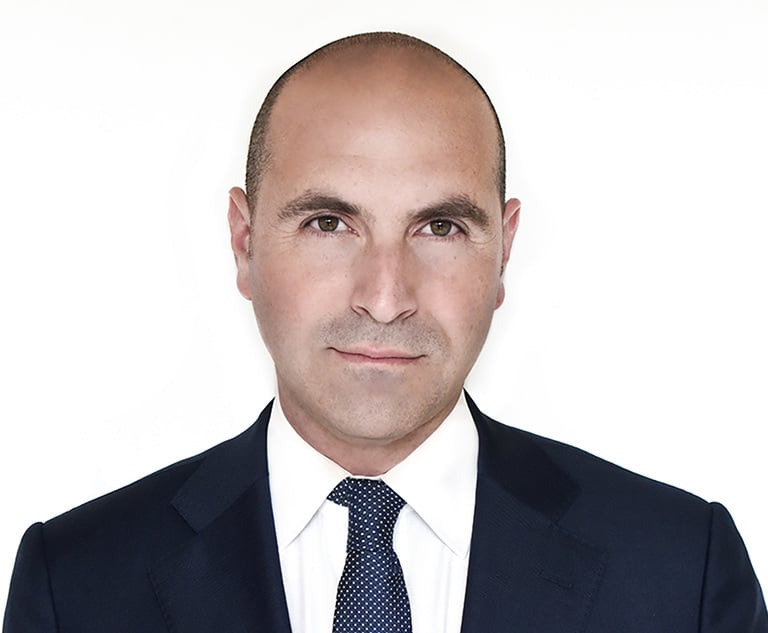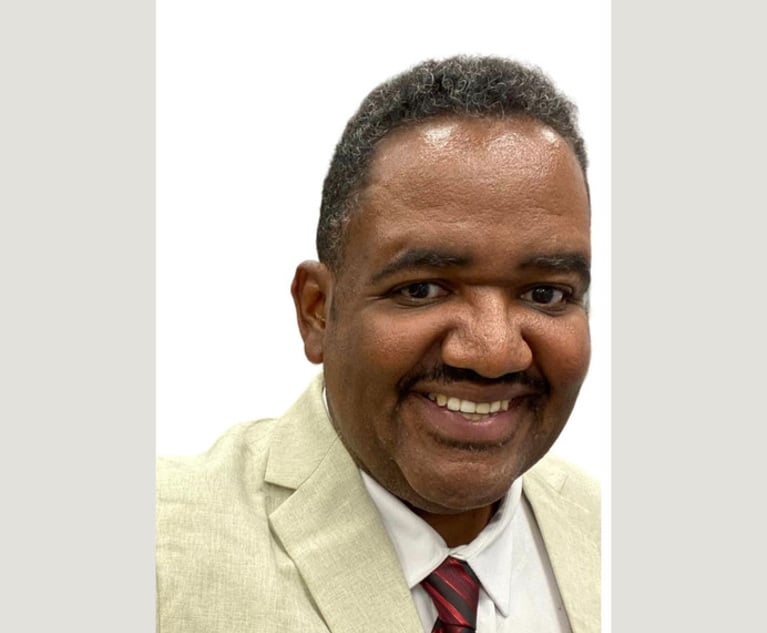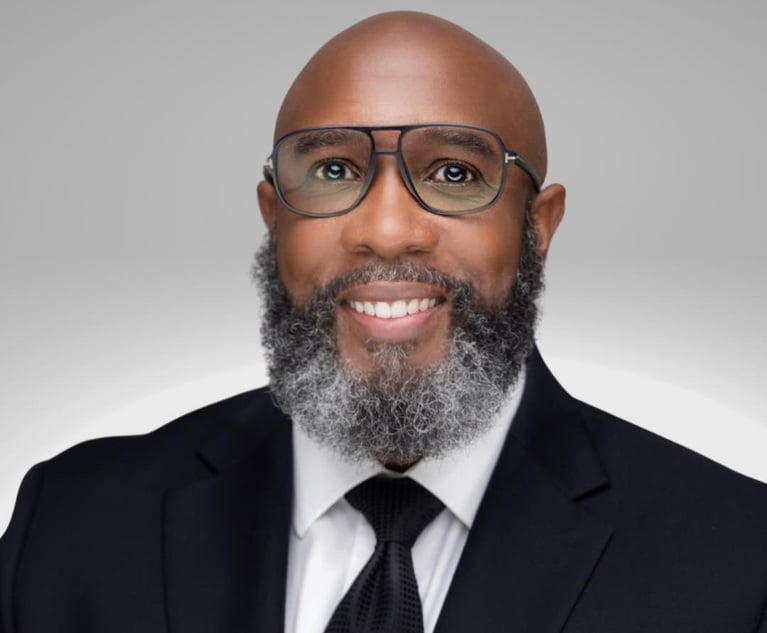 Matthew Dietz, litigation director at the Disability Indepence Group Inc. in Miami.
Matthew Dietz, litigation director at the Disability Indepence Group Inc. in Miami.From Park Avenue Penthouse to Puppy Pit: Miami Lawyer Matthew Dietz Won't Stop Advocating
"He worked with the board to improve it, (and) worked against the board when he thought we were wrong," Florida Board of Bar Examiner member Miles McGrane said about Dietz. "But he always did it in a way that you were never offended."
September 13, 2019 at 03:26 PM
8 minute read
Miami civil rights attorney Matthew W. Dietz has spent 20 years stepping on toes by pushing the envelope on Florida's Americans with Disabilities policies.
But it wasn't the path his parents had expected him to follow.
Dietz grew up in a penthouse apartment on Park Avenue in New York City, attending the same private school that now-disgraced financier Jeffrey Epstein later bought and converted into a mansion. Dietz was seemingly destined to continue the family insurance adjusting business.
But there was one problem: He couldn't stand it.
Family politics and business were a difficult mix, in Dietz's veiw. And he'd met Deborah, his future wife, at university.
"As the baby of three children, my parents were not that excited that I had a serious girlfriend that moved back to New York with me, and even less happy when I got engaged," he said.
Dietz left the family business to elope with Deborah and attend law school, unfortunately sparking a rift between him and his parents that lasted years.
Enter Brooklyn Law School, which Dietz says transformed him from a "hardcore conservative to a hardcore liberal." He volunteered for the Center for Constitutional Rights and became secretary of the Fourth Amendment committee of the American Civil Liberties Union.
Dietz had assumed knowing criminal procedure mattered most, until one ACLU leader explained their long and honored tradition of disagreeing with the U.S. Supreme Court.
"I thought that was so damn cool, that you could say we could disagree and we could make change, not withstanding what the law says," Dietz said. "And that stuck with me. To say, 'OK, the law says this, but I could change it.'"
ADA law wasn't on the curriculum in the 1990s, so Dietz hadn't heard of it until he joined a Florida insurance defense firm. In a rare plaintiffs case, he represented a woman who had gotten her arm trapped in a Carnival Cruise Line elevator door while using a walker.
Cruise ships weren't compliant with the ADA in 1998, when Dietz met quadriplegic attorney Edward Resnick, founder of Access Now Inc.
And Resnick had an idea.
"He was like, 'Why don't you sue Carnival to make all their ships accessible?' I was so incredibly stupid, I thought it was a great idea," Dietz said. "I was a masochist for thinking I could go against the biggest cruise line in the world."
Dietz brought a groundbreaking class action lawsuit against Carnival, which settled in 2001.
|'Truth is I never really made a profit'
Dietz fell ill in 2000 with acute pancreatitis, but an epiphany came from his three-month hospital stay: he'd create a law firm for people with disabilities.
"I went out to the Center for Independent Living, and I wanted to meet people in the community and see what their issues were," Dietz said. "The problems were a lot of their bread-and-butter issues: going to see a doctor, getting transportation, getting accessible housing."
Dietz soon found that more than 50% of Fair Housing cases were disability-related and took on a case for the HOPE Fair Housing Center involving families blocked from living at a development because they had more than one child per room. He sought an injunction and now represents all Fair-Housing organizations in Florida.
Attitude is the biggest roadblock to accommodations, Dietz says, as people resist change.
"If it doesn't harm anybody else, what's the big deal? And if you really can't think of a big deal, then it's usually not," Dietz said.
Dietz's firm merged with his nonprofit organization Disability Independence Group in 2014.
"People always ask me, why do I want to be a nonprofit? And the truth is, I never really made a profit beforehand," Dietz quipped.
President and CEO of HOPE in Miami and Broward Keenya Robertson described Dietz as fierce and focused—the only attorney she's worked with who has injected himself everywhere the Fair Housing movement went.
"[Dietz] walked away from certain privileges and advantages that he may have had, given his family ties and wealth, to pursue something that he truly believes in," Robertson said. "He's that attorney that will go to the mat for you."
Stephen Hunter Johnson served as opposing counsel in one housing-discrimination case in which Dietz's approach to resolving the suit was "unyielding," but never unreasonable, geared at educating, instead of penalizing defendants.
"Matt's the type of lawyer that will make you on other side care about the issues and the things he's advocating for," Johnson said.
|'He has a name'
Dietz represented someone whom the media often described as "the autistic man with his caretaker Charles Kinsey," who was shot in 2016 by Miami-Dade police, despite being unarmed.
"The first thing I said is, 'He has a name. His name is Arnaldo Eliud Rios-Soto,'" Dietz said. "Because the first thing they do is they dehumanize persons with disabilities. They're invisible, and that's what allows the state to put them into nursing homes, or put them into other places and shut them away like potted plants."
 Matthew Dietz at a monthly social he hosts for young adults with developmental disabilities. Courtesy Photo
Matthew Dietz at a monthly social he hosts for young adults with developmental disabilities. Courtesy Photo
Dietz holds a monthly supper social for young adults with developmental disabilities. He hopes to get more people with disabilities into law, believing stigma won't end until everyone has a seat at the table.
His office is dotted with photos of his son Max, who's in law school and "much smarter" than him, according to the attorney. Max, who's autistic, majored in psychology and is conducting a rare study analyzing how autistic people respond to moral dilemma questions.
"There's always been this misconception that people with autism have a lack of empathy, and he said that's not so," Dietz said.
A self-professed "bar junkie," Dietz negotiated a confidential settlement in March with the Florida Bar Board of Examiners over claims its admissions process was unfair to applicants with a history of mental health or substance abuse problems. Now the board's changed its rules, Dietz plans to challenge other bar rules he believes create a second class for lawyers with disabilities.
Miles A. McGrane III, former president of the Florida Bar and member of the Florida Board of Bar Examiners, said Dietz has "more exuberance than I've ever seen in any lawyer."
"He worked with the board to improve it, worked against the board when he thought we were wrong," McGrane said. "But he always did it in a way that you were never offended, even when he was on the other side."
 Matthew Dietz at the puppy pit. Courtesy photo.
Matthew Dietz at the puppy pit. Courtesy photo.
Dietz's desk is furnished with dog treats, as he brings his dog Lucy to work with him. He says he gets at least two calls a week about emotional support animals.
"If it makes life a little bit better, and life is so hard, why not?" he said.
Dietz is also chair of the bar's animal law section—a position he refused to accept unless he could get a puppy pit, designed to help bar convention attendees relax.
"That was phenomenal," Dietz said. "I had everybody there hugging dogs, holding dogs. My opposing counsel that had never smiled before at me would smile when I put a dog in her arms. It's amazing what a puppy could do."
Dietz introduced goat yoga to the 2019 convention and is pushing for it to qualify for continuing legal education credits.
Win or lose, Dietz said there's no case he wouldn't take again.
"They are very few professions where you really do have power," he said. "And what I view my power as is to give people the power. I give people that believe they are absolutely powerless as much power as the state government. It's an honor that I'm able to do that."
Matthew W. Dietz
Born: October 1970, New York City
Spouse: Deborah
Children: Max
Education: Brooklyn Law School, J.D., 1996; Boston University, B.S., 1992
Experience: Litigation director and president of Disability Independence Group, 2014-present; Law Offices of Matthew W. Dietz, 2001-2013; Gaebe, Murphy, Mullen & Antonelli, 1997- 2001
This content has been archived. It is available through our partners, LexisNexis® and Bloomberg Law.
To view this content, please continue to their sites.
Not a Lexis Subscriber?
Subscribe Now
Not a Bloomberg Law Subscriber?
Subscribe Now
NOT FOR REPRINT
© 2025 ALM Global, LLC, All Rights Reserved. Request academic re-use from www.copyright.com. All other uses, submit a request to [email protected]. For more information visit Asset & Logo Licensing.
You Might Like
View All
Growing Referral Network, Alternative Fees Have This Ex-Big Law’s Atty’s Bankruptcy Practice Soaring
5 minute read
Against the Odds: Voters Elect Woody Clermont to the Broward Judicial Bench
4 minute read
Miami Civil Judge Myriam Lehr to Say Goodbye to the County Court Bench
4 minute readTrending Stories
- 1Restoring Trust in the Courts Starts in New York
- 2'Pull Back the Curtain': Ex-NFL Players Seek Discovery in Lawsuit Over League's Disability Plan
- 3Tensions Run High at Final Hearing Before Manhattan Congestion Pricing Takes Effect
- 4Improper Removal to Fed. Court Leads to $100K Bill for Blue Cross Blue Shield
- 5Michael Halpern, Beloved Key West Attorney, Dies at 72
Who Got The Work
Michael G. Bongiorno, Andrew Scott Dulberg and Elizabeth E. Driscoll from Wilmer Cutler Pickering Hale and Dorr have stepped in to represent Symbotic Inc., an A.I.-enabled technology platform that focuses on increasing supply chain efficiency, and other defendants in a pending shareholder derivative lawsuit. The case, filed Oct. 2 in Massachusetts District Court by the Brown Law Firm on behalf of Stephen Austen, accuses certain officers and directors of misleading investors in regard to Symbotic's potential for margin growth by failing to disclose that the company was not equipped to timely deploy its systems or manage expenses through project delays. The case, assigned to U.S. District Judge Nathaniel M. Gorton, is 1:24-cv-12522, Austen v. Cohen et al.
Who Got The Work
Edmund Polubinski and Marie Killmond of Davis Polk & Wardwell have entered appearances for data platform software development company MongoDB and other defendants in a pending shareholder derivative lawsuit. The action, filed Oct. 7 in New York Southern District Court by the Brown Law Firm, accuses the company's directors and/or officers of falsely expressing confidence in the company’s restructuring of its sales incentive plan and downplaying the severity of decreases in its upfront commitments. The case is 1:24-cv-07594, Roy v. Ittycheria et al.
Who Got The Work
Amy O. Bruchs and Kurt F. Ellison of Michael Best & Friedrich have entered appearances for Epic Systems Corp. in a pending employment discrimination lawsuit. The suit was filed Sept. 7 in Wisconsin Western District Court by Levine Eisberner LLC and Siri & Glimstad on behalf of a project manager who claims that he was wrongfully terminated after applying for a religious exemption to the defendant's COVID-19 vaccine mandate. The case, assigned to U.S. Magistrate Judge Anita Marie Boor, is 3:24-cv-00630, Secker, Nathan v. Epic Systems Corporation.
Who Got The Work
David X. Sullivan, Thomas J. Finn and Gregory A. Hall from McCarter & English have entered appearances for Sunrun Installation Services in a pending civil rights lawsuit. The complaint was filed Sept. 4 in Connecticut District Court by attorney Robert M. Berke on behalf of former employee George Edward Steins, who was arrested and charged with employing an unregistered home improvement salesperson. The complaint alleges that had Sunrun informed the Connecticut Department of Consumer Protection that the plaintiff's employment had ended in 2017 and that he no longer held Sunrun's home improvement contractor license, he would not have been hit with charges, which were dismissed in May 2024. The case, assigned to U.S. District Judge Jeffrey A. Meyer, is 3:24-cv-01423, Steins v. Sunrun, Inc. et al.
Who Got The Work
Greenberg Traurig shareholder Joshua L. Raskin has entered an appearance for boohoo.com UK Ltd. in a pending patent infringement lawsuit. The suit, filed Sept. 3 in Texas Eastern District Court by Rozier Hardt McDonough on behalf of Alto Dynamics, asserts five patents related to an online shopping platform. The case, assigned to U.S. District Judge Rodney Gilstrap, is 2:24-cv-00719, Alto Dynamics, LLC v. boohoo.com UK Limited.
Featured Firms
Law Offices of Gary Martin Hays & Associates, P.C.
(470) 294-1674
Law Offices of Mark E. Salomone
(857) 444-6468
Smith & Hassler
(713) 739-1250







